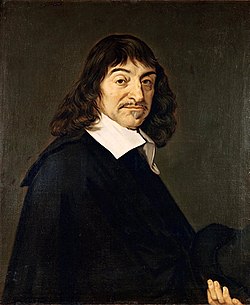René Descartes

The French philosopher René Descartes (1596–1650) was well-connected to, and influential within, experimental philosophy networks. Descartes had an agenda, however, which was geared toward replacing the Scholastic philosophical tradition. Questioning the reality interpreted through the senses, Descartes sought to re-establish philosophical explanations by reducing all phenomena to the motion of an invisible sea of "corpuscles". (Notably, he reserved human thought and God from his scheme, holding these to be separate from the physical universe). In proposing this philosophical framework, Descartes supposed that different kinds of motion, such as that of planets versus that of terrestrial objects, were not fundamentally different, but were manifestations of an endless chain of corpuscular motions obeying universal principles. Particularly influential were his explanations for circular astronomical motions in terms of the vortex motion of corpuscles in space (Descartes argued, in accord with the beliefs, if not the methods, of the Scholastics, that a vacuum could not exist), and his explanation of gravity in terms of corpuscles pushing objects downward.[47][48][49]
Descartes, like Galileo, was convinced of the importance of mathematical explanation, and he and his followers were key figures in the development of mathematics and geometry in the 17th century. Cartesian mathematical descriptions of motion held that all mathematical formulations had to be justifiable in terms of direct physical action, a position held by Huygens and the German philosopher Gottfried Leibniz, who, while following in the Cartesian tradition, developed his own philosophical alternative to Scholasticism, which he outlined in his 1714 work, the Monadology. Descartes has been dubbed the "Father of Modern Philosophy", and much subsequent Western philosophy is a response to his writings, which are studied closely to this day. In particular, his Meditations on First Philosophy continues to be a standard text at most university philosophy departments. Descartes' influence in mathematics is equally apparent; the Cartesian coordinate system – allowing algebraic equations to be expressed as geometric shapes in a two-dimensional coordinate system – was named after him. He is credited as the father of analytical geometry, the bridge between algebra and geometry, important to the discovery of calculus and analysis.
Комментариев нет:
Отправить комментарий